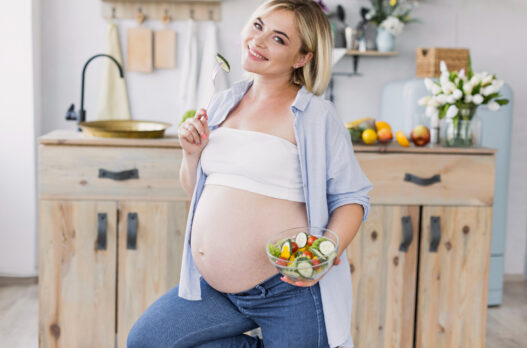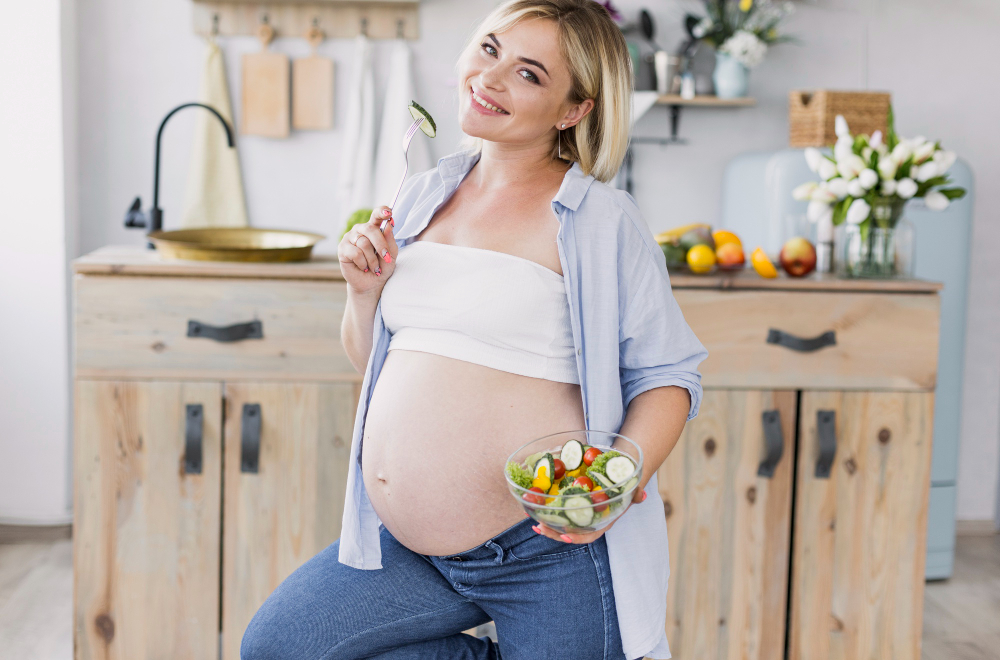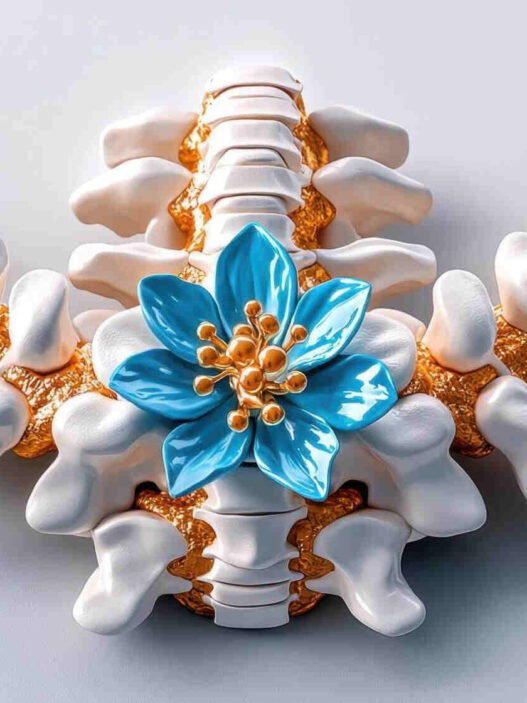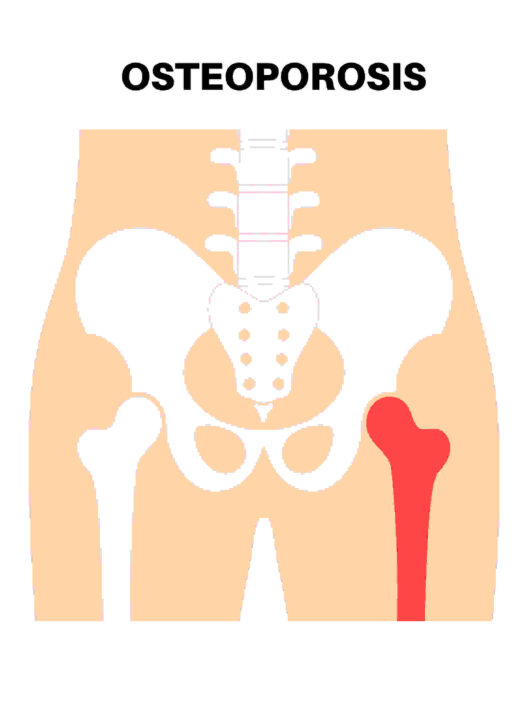What is the real food in pregnancy? Which food to eat during pregnancy? What are the daily nutritional requirements during pregnancy? What is the importance of each nutrient during pregnancy? Here is a pregnancy diet plan, food chart, and guide to answer all your queries related to your pregnancy nutrition. An insight into the essential nutrients, functions, and sources of calcium, choline, copper, DHA, and fiber, folic acid (B9), iron, and iodine in pregnancy in addition to omega-3 and omega-6 fatty acids, protein, and water that must be included in your plate is discussed to guide you in achieving proper nutrition during your pregnancy.
The greatest gift you can give your baby is a daily dose of adequate and essential nutrients. This can help your baby to have good growth and development as well as can reduce any pregnancy-related complications which include Gestational Diabetes, Anemia, Preeclampsia, and many others. The entire Pregnancy Nutrition is somewhat similar to your Pre-pregnancy diet, except for a few changes in its quantities.
List of essential nutrients required during pregnancy:
These essential nutrients that are required during pregnancy include calcium, choline, copper, DHA, fiber, folic acid (B9), iron, iodine, omega-3, omega-6 fatty acids, protein, and water. Each essential nutrient will be discussed below for its important functions, quantity required, and important food sources.
1. CALCIUM AS AN ESSENTIAL NUTRIENT FOR PREGNANCY
This is one of the major mineral which is stored maximum (99%) in bones and teeth and lesser than 1% in other soft tissues in your body.
Why do I need Calcium during my Pregnancy?
The growth of your baby’s bones and teeth uses the calcium reserves from your body. This also means that, in case you don’t consume adequate calcium in your diet during pregnancy, your body keeps depleting the calcium from your bones to provide for your baby’s needs. This ultimately leads to a shortage in both of your bodies. This can cause osteoporosis (brittle bones) in you. Thus, calcium is the real food to be consumed during pregnancy.
So how much Calcium do I need to intake during my Pregnancy?
Calcium required during pregnancy by pregnant mothers aged 19 and above is 1000 mg per day, whereas below 18 pregnant mothers require 1300 mg per day.
Ok, now what are the best sources of Calcium?
Leafy Greens, Kale, Broccoli, Milk, Cheese, Yogurt, Salmon, Tuna, Sardines, Calcium-fortified Orange Juice, and many more. These can be consumed for obtaining calcium during pregnancy.
2. CHOLINE AS ONE OF THE ESSENTIAL NUTRIENTS DURING PREGNANCY
Many physiological processes including neurotransmitters production in the brain require Choline, as also during pregnancy, which is a vitamin-like nutrient. The structuring of Cell Membranes is carried out with the help of Phospholipids which are made by Choline.
Why do I need Choline during my Pregnancy?
Fetal Brain Development like the memory center is ensured by Choline during pregnancy. Proper fetal brain development by choline has the ability to affect cognition later in your baby’s life. Some researchers have reported a reduced incidence of Neural-tube defects with Choline intake during pregnancy.
So how much Choline should I intake during my Pregnancy?
All age group mothers require 450 mg per day of choline during pregnancy.
Ok, now what are the best sources of Choline?
Lean Beef, Eggs, Chicken, Salmon, Cauliflower, Broccoli, and others are some of the best sources of choline and can be consumed during pregnancy.
3. COPPER AS AN ESSENTIAL NUTRIENT DURING PREGNANCY
Proper growth, maintenance, and development of bone, brain, connective tissue, organ tissue, and heart are met by Copper. It is one of the vital trace minerals and micronutrients and is required during pregnancy.
Why do I need Copper during Pregnancy?
As your blood supply doubles and your energy levels drop, you require copper. Copper helps in making your baby’s blood vessels, heart, cells, immune, nervous and skeletal systems. Hence, copper is required during pregnancy.
So how much Copper should I intake during my Pregnancy?
All age group mothers require 1000 mcg per day of copper during pregnancy.
Ok, now what are the best sources of Copper?
Cashews, Sunflower Seeds, Crab, Shiitake Mushrooms, Cocoa, Lentils, Prunes, Black Pepper, and Whole Grains are some of the best sources of copper during pregnancy.
4. DOCOSAHEXAENOIC ACID (DHA) AS ONE OF THE ESSENTIAL NUTRIENTS IN PREGNANCY
The brain and eyes contain an important nutrient called docosahexaenoic acid or DHA. It is one of the omega-3 fatty acids and is required during pregnancy.
Why do I need DHA during Pregnancy?
Visual and mental development is enhanced in your baby while consuming DHA during pregnancy. The retina, which is a layer of tissue behind the eye which perceives light, is beginning to form and your baby’s eye structure keeps getting complex. This requires the intake of more DHA by you in your diet during pregnancy.
So how much DHA should I intake during my Pregnancy?
All age group mothers require 200 to 300 mg per day of DHA during pregnancy.
Ok, now what are the best sources of DHA?
Fortified Eggs, Sardines, Salmon, Tuna, Chia seeds, and others are some of the best sources of DHA and must be consumed during pregnancy.
5. FIBER AS ESSENTIAL NUTRIENT DURING PREGNANCY
The nutrient fiber is plant-based and helps in the movement of food throughout the body by delivering nutrients essential to different organs as per their need.
Why do I need Fiber During Pregnancy?
Fiber during pregnancy help in regulating your blood sugar levels thereby preventing Gestational Diabetes. Preeclampsia can also be prevented by fiber by reducing the risk of increased blood pressure during pregnancy. Constipation is also prevented by consuming fiber in your diet during your entire term of pregnancy.
So how much Fiber do I need to intake during my Pregnancy?
All age group mothers require 25 to 35 grams per day of fiber during pregnancy.
Ok, now what are the best sources of Fiber?
Cereals made with Oats and Whole Grains, Whole Grain Breads, Lima and Black Beans, Tortillas and Waffles, Quinoa, Brown Rice, Lentils, Various Fresh Fruits, Greens like Peas and Broccoli, Chia seeds, a mixture of Bran into Yogurt, Burgers or Smoothies, Baked Potatoes with skin, Whole Wheat Pasta and many more are the best sources of fiber. These should be taken during pregnancy.
6. VITAMIN B9 (FOLIC ACID) AS AN IMPORTANT ESSENTIAL NUTRIENT IN PREGNANCY
Vitamin B9 or folic acid is one of the important nutrients not only in the prenatal and postnatal period but, including antenatal (during pregnancy) for your entire term. Folic acid or B9 helps with your baby’s brain during pregnancy as well as spinal cord development and in the production of red blood cells. Protein breakdown, creation, and usage as building blocks in our body are also ensured by folic acid or B9 in pregnancy. The assistance in the circulatory system and heart formation in your baby with DNA creation is also taken care of by B9. Spina bifida can be reduced by folic acid or B9 if used very early in pregnancy. So, folic acid or B9 is indeed the real food in pregnancy.
Why do I need Folic Acid (Vitamin B9) during my Pregnancy?
Earlier intake of folic acid or vitamin B9 is advised as many defects in birth develops during the first few weeks of pregnancy. Folic acid or B9 also aids in many key developments in your baby’s body so, there is a continuing need throughout pregnancy. Pre-term Delivery, Heart defects, and Gestational Diabetes can be prevented too by taking adequate folic acid or vitamin B9.
So how much Folic Acid or B9 should I intake during my Pregnancy?
A month before conception requires 400 mcg per day and 400 to 600 mcg of folic acid or B9 is required throughout pregnancy as well as post-delivery for lactation.
Ok, now what are the best sources of Folic Acid or B9?
Strawberries, Oranges, Green Leafy Vegetables, Kidney Beans, Fortified Breakfast Cereals, Cauliflower, Beets, Nuts, Chia seeds, and many more. These are the good sources of folic acid or B9 during pregnancy.
7. IODINE AS ONE OF THE ESSENTIAL NUTRIENTS IN PREGNANCY
Iodine is yet another real food in pregnancy that enhances brain development and the production of thyroid hormones.
Why do I need Iodine during my Pregnancy?
Your baby’s Brain and Nervous System development are taken care of by Iodine during pregnancy. Iodine regulates the functions and secretion of Thyroid hormone as well as regulates core body functions like heart rate, metabolism, and body temperature hence iodine is required during pregnancy. Intellectual disability is prevented by iodine during pregnancy as per the report by WHO and CDC in the world.
So how much Iodine do you need to intake during Pregnancy?
All age group mothers require 220 to 250 mcg per day of iodine during pregnancy and this should not exceed 1100 mcg in a day.
Ok, now what are the best sources of Iodine?
Plain Yogurt, Eggs, Tuna, Milk, Cheddar Cheese, Shrimp, and Iodized Table Salt are the best sources of iodine to consume during pregnancy.
8. IRON AS AN ESSENTIAL NUTRIENT DURING PREGNANCY
Iron is an essential micronutrient to produce RBCs as your body’s blood volume increases due to pregnancy as well as for the growing baby. Iron aids in growth, development, cell functioning, and building of connective tissues and hormones making iron one of the real foods in pregnancy.
Why do I need Iron during Pregnancy?
Your body’s increased demand for iron can be experienced through feeling tired very often. This mineral is a key in transferring oxygen for the mother as well as the baby and hence iron is required during pregnancy.
So how much Iron do I need to intake during my pregnancy?
Iron intake basically depends on your iron levels, so it is best advised to take a test to find your iron levels during pregnancy. Ideally, for normal pregnant mothers, 27 mg per day is recommended during pregnancy.
Ok, so what are the best sources of Iron?
Beef, Chicken, Spinach, Eggs, Beans, Kale, and many more are the common sources of iron that can be consumed during pregnancy.
9. OMEGA 3 FATTY ACIDS AS ESSENTIAL NUTRIENTS DURING PREGNANCY
Omega-3 fatty acids are considered good as they fight inflammation, increase good cholesterol (HDL) and reduce bad cholesterol (LDL) as well as reduces blood pressure. We have already discussed DHA during pregnancy above. However, omega-3 fatty acids include not only DHA but also α-linolenic acid (ALA), eicosapentaenoic acid (EPA), and docosahexaenoic acid (DHA).
Why do I need Omega 3 fatty acids during Pregnancy?
Omega-3 fatty acids sustains the health of your baby’s growing heart, brain and eyes and immune system more specifically during your third trimester of pregnancy when your baby’s brain development is in its peak. Postpartum Depression, reduced risk of preterm births, Low Birth Weight and regulation of pregnancy mood swings is aided using DHA and other Omega-3 Fatty Acids during pregnancy.
So how much Omega 3 do I need to intake during my pregnancy?
All age mothers require 200 to 300 mg per day of omega-3 fatty acids during pregnancy.
Ok, so what are the best sources of Omega 3 fatty acids?
Eggs, Trout, Flax Seed, Salmon, Cod, Grass-fed Beef, Tuna, Free-range Chicken, Sardines, Crab, Shrimps and many more are the sources of omega-3 fatty acids and can be consumed during pregnancy.
10. OMEGA 6 FATTY ACIDS AS ESSENTIAL NUTRIENTS DURING PREGNANCY
Our body has the inability to create Omega-6 Fatty Acids on its own, so the only option you can resort to is by getting them through the food you consume.
Why do I need Omega 6 fatty acids during Pregnancy?
Omega-6 fatty acids have a huge impact on your baby’s growing brain and its functions as well as its physical growth and development and hence required during pregnancy. Polyunsaturated fatty acids (PUFAs) are ideal in helping the functioning of skin, bone growth and hair including a proper functioning of reproductive system and a control over the body’s metabolism levels are also aided by PUFA during pregnancy.
So how much Omega 6 do I need to intake during my pregnancy?
All age mothers require 13 grams per day of omega-6 fatty acids during pregnancy.
Ok, so what are the best sources of Omega 6 fatty acids?
The best sources of omega-6 fatty acids are Walnuts, Vegetable Oil, Pine Nuts, Sesame Seeds, pecan, Almonds, Brazil Nuts, Pumpkin Seeds, and many more that can be taken during pregnancy.
11. PROTEIN AS ONE OF THE ESSENTIAL NUTRIENTS IN PREGNANCY
Protein is made of amino acids and is also referred to as the building blocks of our body. Protein is yet another real food in pregnancy that maintains the repair, building, and development of muscles, skin, bones, hair, blood, and nails and also regulates enzymes, hormones, and other chemical reactions within your body and must be consumed during pregnancy.
Why do I need protein during Pregnancy?
Protein is the major cause of developing your baby’s cute face and body. The transformation of your baby’s organs happens during the middle or towards the end of your pregnancy and hence adequate protein is required during that period of pregnancy.
So how much protein do I need to intake during my pregnancy?
All age mothers require 75 grams per day of protein during pregnancy.
Ok, so what are the best sources of protein?
Eggs, Poultry, Milk, Meat, Cheese, Nuts, Beans, Yogurt, and others are some of the best sources of protein and may be taken during pregnancy.
12. WATER IS ESSENTIAL DURING PREGNANCY
Though water is not a nutrient, it is very much essential to stay hydrated throughout pregnancy.
Why do I need water during Pregnancy?
Water ensures the delivery of all vital vitamins, minerals, and other macronutrients to all parts of the body according to its needs. Water helps in temperature balance, digestion, and hormonal functions, and in absorbing nutrients as well. Water also helps in the prevention of urinary tract infections (UTIs), headaches, constipation, bladder infections, and hemorrhoids. Hence, staying hydrated by consuming water during pregnancy becomes important.
So how much water do I need to intake during my pregnancy?
The intake of water may vary from individual to individual. The best advice is to ask your health expert regarding the ideal quantity for intake. Generally, 2-3 liters of water alone accompanied with other fluid foods like fresh fruit juices, milkshakes, water fruits, soups, broths, and many more from different sources is adequate during pregnancy.
Conclusion
From the above description of the importance, recommended allowance, and the best food sources of each major nutrient during pregnancy (calcium, choline, copper, DHA, fiber, folic acid/ B9, iodine, iron, omega-3, omega-6, protein, water), it is inferred that a correct check on the nutrients and a regular check with your Gynecologist (Antenatal Clinical Visits) are recommended along with a Consultation with your Pregnancy Nutritionist for a safe and healthier pregnancy without any adverse complications.
Disclaimer - It is important to consult your Gynaecologist before following any dietary advice or making changes in your diet or starting any supplement. The readers must consult their physician and refer to our medical disclaimer at the bottom of the page.
Sources
1. National Institute of Health, National Library of Medicine, Pregnancy and Nutrition (January 2017).
2. American Academy of Obstetricians and Gynecologists, Nutrition during Pregnancy, (2020).
3. Mayo Clinic, Pregnancy Diet: Focus on these Essential Nutrients, December 2020.

Emi Grace Mary Gowshika. R is M.Sc. Dietetics and presently pursuing Ph.D. She is also a certified pregnancy nutritionist based at Chennai, India.











